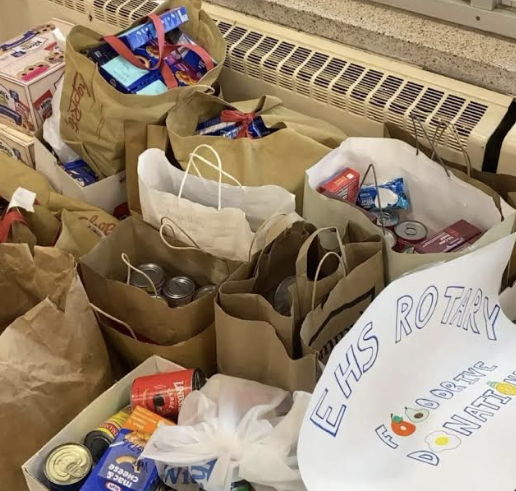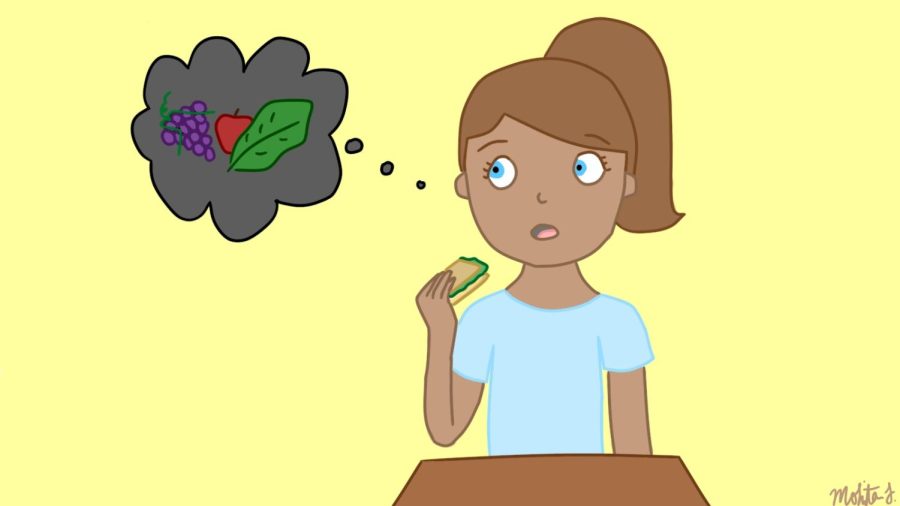Is Veganism Hurting the Environment?
A girl contemplating whether or not she should go vegan.
April 28, 2022
Since the 1950s, veganism has been growing in the middle class as an environmentally friendly, pro-animal diet. Because of recent studies showing the harmful environmental impacts of the meat and dairy industries, many young adults have decided to go vegan to help the environment. While some people made this switch in recent years, others have been vegan and vegetarian for as long as they can remember, with a diet that has been passed down in their family or culture for generations.
Isha Malaviya ’22 has been vegetarian since she was born.
“A lot of people from my area in India are vegetarian, so I never really saw any other alternative,” she explained. Despite growing up vegetarian, she has never felt constrained to the diet, as others might have.
Sanjana Ramesh ‘22, who follows a Pollotarian diet, feels as though she would struggle without having chicken as a part of her diet. “I’m allowed to eat chicken, but no red meat, and I think it’s a good and easy start for those looking to convert to a vegetarian or vegan diet,” she explains.
But even though many people decided to go vegan to help the environment, it may not be the best option to help prevent or reverse environmental damage. “I know that the produce industry might be bad for the environment,” said Brianna Reed ‘22 who has been vegetarian for personal reasons since she was young, “but there’s pollution with everything. The hairspray you use, the water bottles you drink out of, and the clothes you buy all contribute to pollution. So I didn’t necessarily do it for the environment, I did it for me.”
The veganism trend became popularized when the general public learned about the corruption in the meat industry, and the deterioration of the ozone layer. Many people believed that going vegan or vegetarian was the only way to save the planet, and they looked down at people who did not give up meat.
“A lot of the practices to harvest vegetables in the off season are very unhealthy and unethical, and it’s just as bad as the meat industry, if not worse,” Malaviya said.
At the end of the day, choosing to go vegan or vegetarian may have personal benefits, but one person will not change our poor environmental climate. The general population choosing to eat meat is not causing climate change, but it seems instead that big business dumping millions of pounds of waste into waterways causes it. All of us can make choices to lower our carbon footprint and going vegan or vegetarian could help contribute to that in some ways. However, until large meat, dairy, and other food industry corporations change their facilities, the choices in the foods you eat will not have a large enough impact to make a substantial difference. No person choosing to eat meat or not can change the course of the world, so personal reasons prove to be more of a reasonable standard at this point.
While there are many reasons to be skeptical about going vegan or vegetarian, the change in diet also has benefits for many people: Some may use it as a diet or a reason to feel like they are making a change, but there are many other positive reasons to go vegan. For some, taking meat and dairy out of their diet has health benefits as well. According to an article done by Rush University System for Health entitled “Health Benefits of a Vegan Diet,” reducing your animal product intake can help prevent colon cancer, and other types of cancers. Additionally, the article mentions that veganism can reduce your risk of heart disease, help prevent existing heart disease from worsening, and can also help promote weight loss. Eating a plant-based diet has proven to have health benefits, and others agree.
“ I have so much more energy ever since I switched to going vegan, and I overall feel so much better now than I did when I was consuming animal products.” said Casey Kregeloh ‘22.
Choosing a meatless or plant-based diet is sometimes the best choice for people depending on their dietary needs. So what if you want to go vegan or vegetarian? Here is some advice from vegetarian and vegan students at EHS:
“Try to diversify your palette,” explained Malaviya. “You don’t have to just eat a salad every day, when you could open your mind to different cultures, and try different types of food, other than what you know right now.”
“Make sure that you still get protein, even if you have to turn to meat substitutes. If you need to, take supplements and make sure that you get all the nutrients your body needs,” said Reed ‘22.
“It just helps me feel better physically and mentally,” said Kregeloh, “and if it works for you too, that’s great, but don’t feel pressured to try a diet just because it is seen as “better” for the environment, just do what is better for you.”
Going vegan or vegetarian isn’t one size fits all, and a plant-based diet looks different for everyone. Whether it’s for cultural, personal, or for environmental reasons, an animal-free diet has shown to have its pros and cons.
























































































